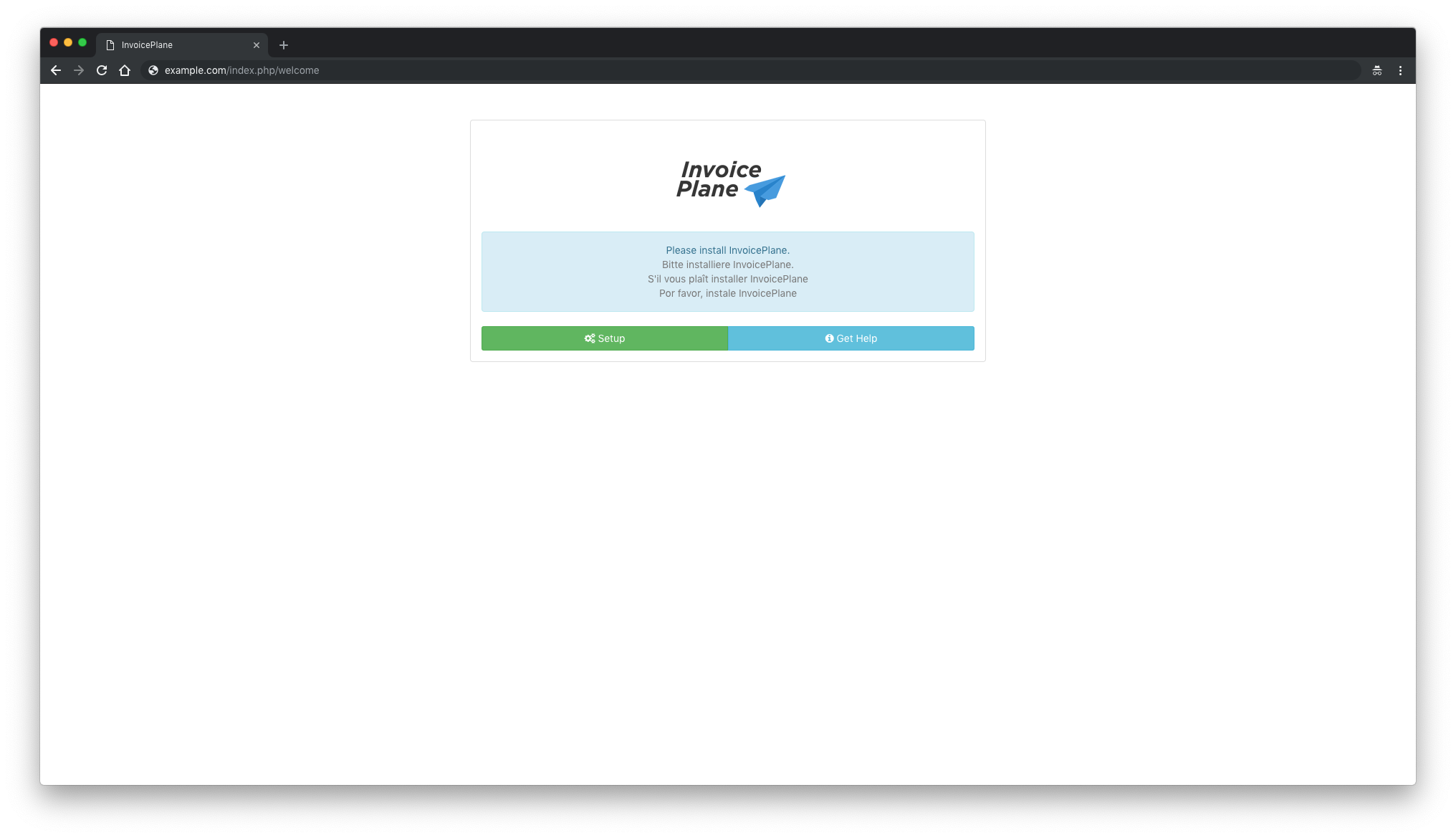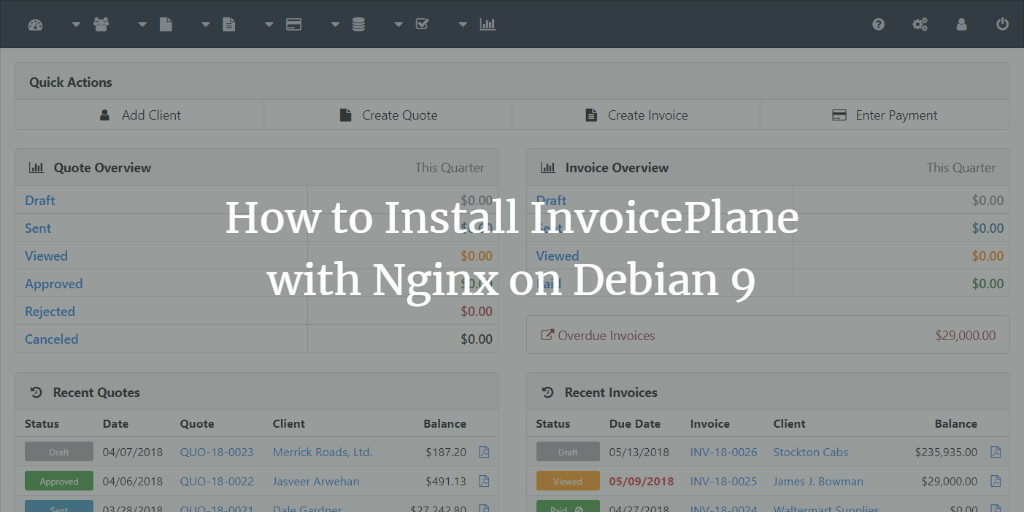InvoicePlane is a free and open-source invoicing application. You can find its source code on GitHub. This tutorial will guide you through installing InvoicePlane on a fresh Debian 9 (stretch) system.
Requirements
- WebServer (Apache, NGINX). This tutorial will use Nginx.
- MySQL version 5.5 or greater or the equivalent version of MariaDB.
- PHP version 7.0, 7.1, or 7.2 with the following PHP extensions installed and activated:
- php-gd
- php-hash
- php-json
- php-mbstring
- php-mcrypt
- php-mysqli
- php-openssl
- php-recode
- php-xmlrpc
- php-zlib
Prerequisites
- A server running Debian 9.
- A non-root user with sudo privileges.
Initial Steps
Check your Debian version:
lsb_release -ds # Debian GNU/Linux 9 (stretch)
Set up the timezone:
sudo dpkg-reconfigure tzdata
Update your operating system packages:
sudo apt update && sudo apt upgrade -y
Install some essential packages:
sudo apt install -y curl wget vim git unzip socat bash-completion apt-transport-https
Step 1 – Install PHP and Required PHP Extensions
InvoicePlane requires PHP version 7.0 or greater. Install PHP and the necessary PHP extensions:
sudo apt install -y php-cli php-fpm php-common php-gd php-json php-mbstring php-mysql php-xmlrpc php-recode
To show PHP compiled in modules, run:
php -m ctype curl exif fileinfo . . . . . .
Check the PHP version:
php --version # PHP 7.0.9-1~deb10u1 (cli) (built: Sep 18 2019 10:33:23) ( NTS ) # Copyright (c) 1997-2018 The PHP Group # Zend Engine v3.3.9, Copyright (c) 1998-2018 Zend Technologies # with Zend OPcache v7.0.9-1~deb10u1, Copyright (c) 1999-2018, by Zend Technologies
Start and enable PHP-FPM service:
sudo systemctl start php7.0-fpm.service sudo systemctl enable php7.0-fpm.service
Step 2 – Install MariaDB
Install MariaDB:
sudo apt install -y mariadb-server
Check the MariaDB version:
mysql --version
Start and enable the MariaDB service:
sudo systemctl start mariadb.service sudo systemctl enable mariadb.service
Run mysql_secure_installation to improve security and set the password for MariaDB root user:
sudo mysql_secure_installation
Answer the questions as follows:
Enter current password for root (enter for none): Set root password? [Y/n]: Y Remove anonymous users? [Y/n]: Y Disallow root login remotely? [Y/n]: Y Remove test database and access to it? [Y/n]: Y Reload privilege tables now? [Y/n]: Y
Log into the MariaDB shell as the root user:
mysql -u root -p # Enter password
Create a MariaDB database and user:
CREATE DATABASE dbname; GRANT ALL ON dbname.* TO 'username' IDENTIFIED BY 'password'; FLUSH PRIVILEGES;
Exit from MariaDB shell:
quit
Replace dbname, username, and password with your own names.
Step 3 – Install NGINX
Install Nginx web server:
sudo apt install -y nginx
Check the NGINX version:
nginx -v # nginx version: nginx/1.10.3
Start and enable the Nginx service:
sudo systemctl start nginx.service sudo systemctl enable nginx.service
Configure NGINX for InvoicePlane:
sudo vim /etc/nginx/sites-available/invoiceplane.conf
Insert the following configuration:
server {
listen 80;
listen [::]:80;
server_name example.com;
root /var/www/InvoicePlane;
index index.php index.html;
location / {
try_files $uri $uri/ /index.php?$query_string;
}
location ~ \.php$ {
include snippets/fastcgi-php.conf;
include fastcgi_params;
fastcgi_param SCRIPT_FILENAME $document_root$fastcgi_script_name;
fastcgi_pass unix:/var/run/php/php7.0-fpm.sock;
}
}Activate the new configuration:
sudo ln -s /etc/nginx/sites-available/invoiceplane.conf /etc/nginx/sites-enabled/
Test the NGINX configuration:
sudo nginx -t
Reload NGINX:
sudo systemctl reload nginx.service
Step 4 – Install InvoicePlane
Download the latest stable version of InvoicePlane and extract it:
sudo mkdir -p /var/www cd /var/www sudo curl -O -J -L https://invoiceplane.com/download/v1.5.9 sudo unzip v1.5.9.zip sudo rm v1.5.9.zip sudo mv ip invoiceplane
Navigate to the installation directory:
cd /var/www/invoiceplane
Rename the configuration file:
sudo cp ipconfig.php.example ipconfig.php
Edit the file to set your URL:
sudo vim ipconfig.php # Example IP_URL=http://example.com
Change ownership of the directory:
sudo chown -R www-data:www-data /var/www/InvoicePlane
Edit the PHP configuration file to set the timezone:
sudo vim /etc/php/7.0/cli/php.ini
Add the following line:
date.timezone = Region/City
Restart PHP-FPM service:
sudo systemctl restart php7.0-fpm.service
Start the InvoicePlane installer in your web browser:
http://example.com/index.php/setup
After installation, you can log into InvoicePlane using your credentials. To secure the installation, you can set DISABLE_SETUP=true in ipconfig.php.
Step 5 – Complete The InvoicePlane Setup
With InvoicePlane installed and configured, access the web installation wizard:
Open your web browser and navigate to http://example.com. You will be guided through the setup process with step-by-step screen instructions.

Links
Frequently Asked Questions
- What is InvoicePlane?InvoicePlane is an open-source invoicing software designed to provide users with a convenient way to manage billing and invoices.
- Is InvoicePlane free?Yes, InvoicePlane is completely free to use and modify.
- Can I run InvoicePlane on other Linux distributions?While this guide is for Debian 9, InvoicePlane can be installed on other Linux distributions with similar steps adjusted for the specific environment.
- Where can I get support or assistance?Support can be obtained through the InvoicePlane community forums or from developers on GitHub.
